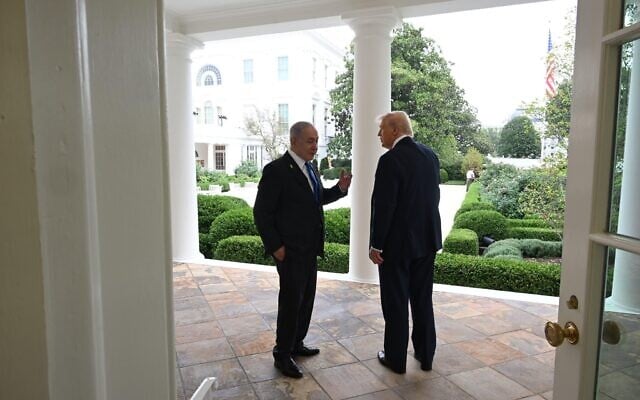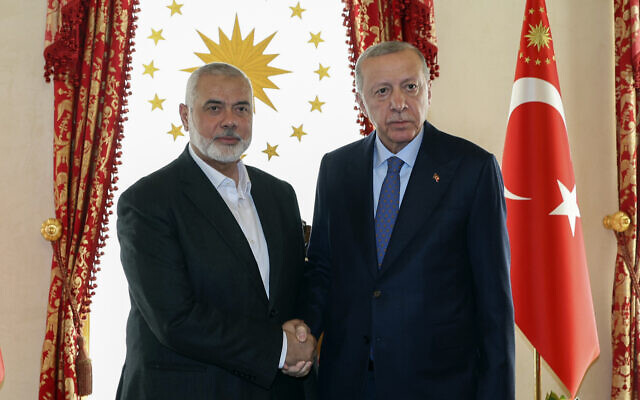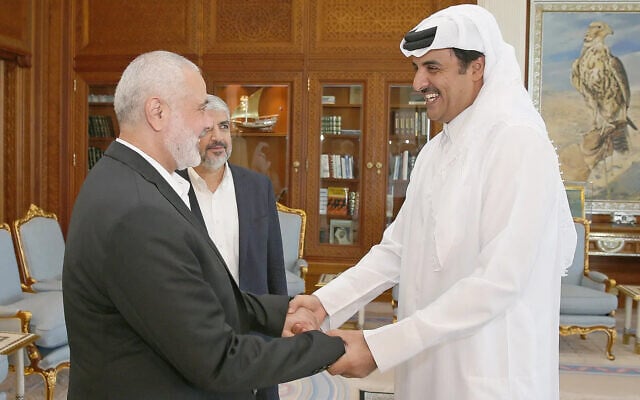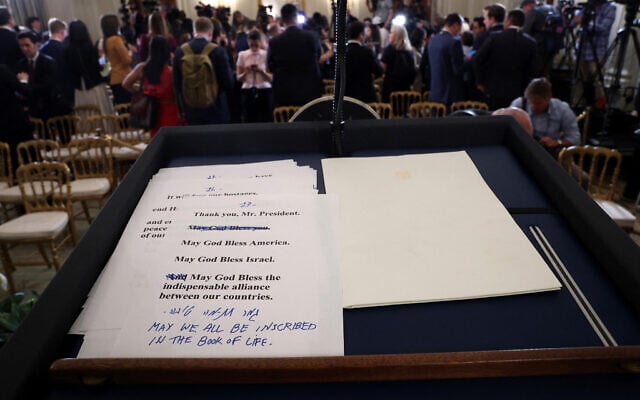

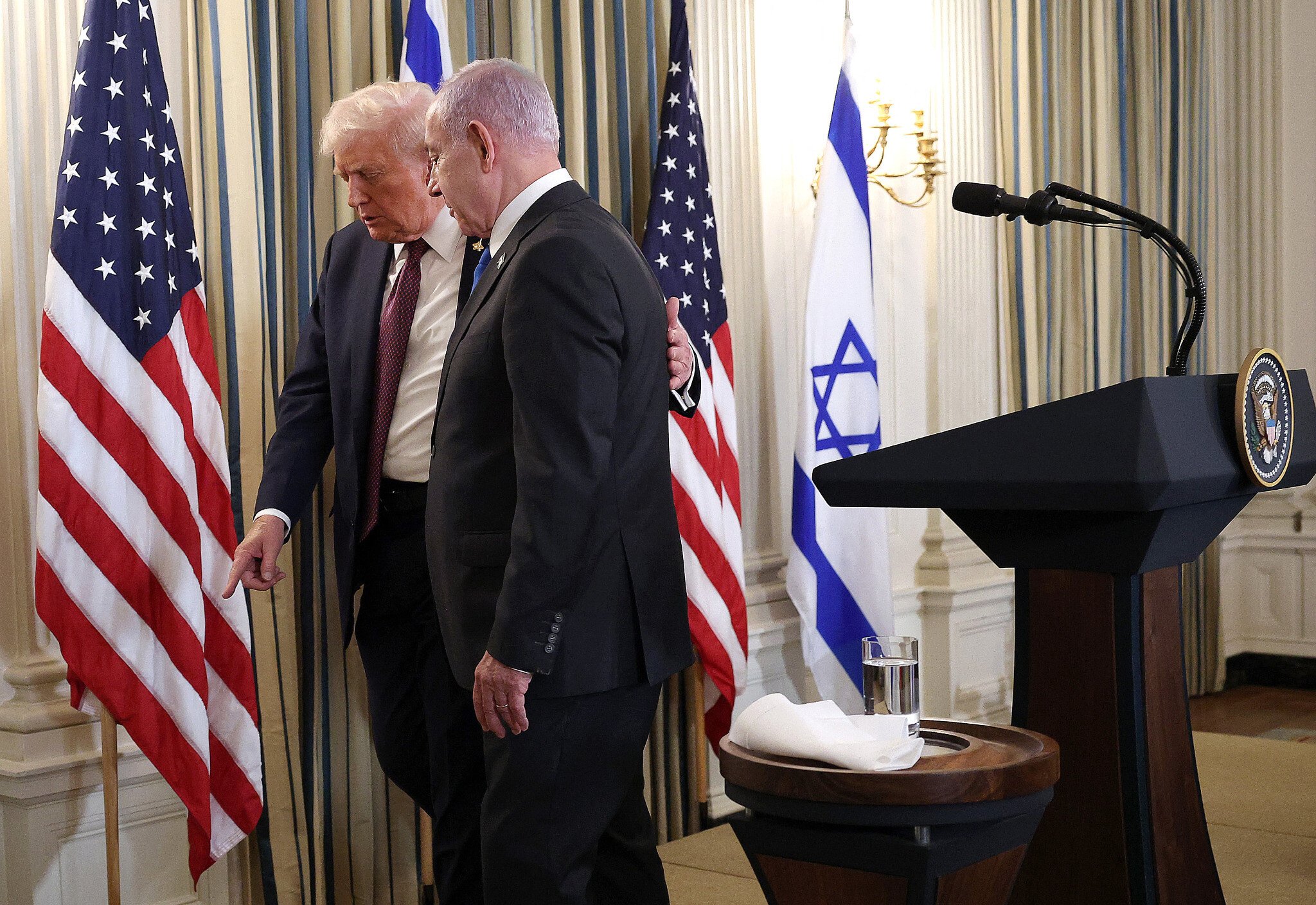
This Editor’s Note was sent out earlier Wednesday in ToI’s weekly update email to members of the Times of Israel Community. To receive these Editor’s Notes as they’re released, join the ToI Community here.
At the start of Yom Kippur, this most solemn and momentous of days in the Jewish calendar, let us allow ourselves a modicum of hope.
Never short on hyperbole — hailing “potentially one of the great days ever in civilization” — but also never blind to the astonishing global power of his office, US President Donald Trump on Monday managed to line up an unprecedented array of Arab and Muslim leaders in an attempt to bring an end to two years of Israel’s war against the mass murderers of Hamas, and secure the release of all the hostages, living and dead, held in Gaza since the Hamas-led invasion and massacre in southern Israel on October 7, 2023.
In presenting his plan, Trump also provided succinct and overdue clarification of how we got into the dismal reality in which we have been living for almost two years, reminding a watching world that, for all the international and internal Israeli anguish over the death and devastation of the war, this began with Hamas’s invasion, unprovoked and from territory from which Israel had completely withdrawn. And that it continues because Hamas refuses to free the hostages and lay down its arms.
After seizing power in post-Israel Gaza, the president recalled, Hamas “diverted resources to build over 400 miles of tunnels and terror infrastructure, rocket production facilities, and hid their military command post and launch sites in hospitals, schools and mosques. So if you went after them… you ended up knocking out a hospital or a school or a mosque. A terrible thing, terrible way to have to fight.”
There seems to be no adequate reason why what remains of Hamas would give up its best means of leveraging its survival and revival, namely the hostages it seized on that infernal day and has held in its underground hellholes ever since, and agree to free them all in the very first two or three days of the framework that Trump presented. Least of all when the 20-point Trump plan gives no clear timeline for an Israeli military withdrawal, and makes no specific commitment to the establishment of a Palestinian state.
More broadly, there would appear to be no compelling reason why an organization that exists solely to destroy the state of Israel and kill Jews would consent, as the terms of Trump’s proposal require, to a formula clearly constructed to ensure its demise.
Most Gazans are sick of this war. Most of Israel is sick of this war. The Middle East is sick of this war. The world is sick of this war. But Hamas has vowed to carry out October 7s again and again until Israel is gone, and one of its leaders, Mahmoud Mardawi, repeated this week its refusal to give up its weapons, insisting on the legitimacy of all means of resistance to “the occupation” — by which Hamas means Israel.
And yet, Arab and Muslim leaders from neighboring Egypt and Jordan, and more distant Turkey, Qatar, the UAE, Saudi Arabia, Pakistan and Indonesia — some at peace with Israel, some deeply hostile to Israel — have pledged to help Trump realize his dryly self-acknowledged “complex” vision of healing Gaza, ensuring Israel’s security, and moving toward “eternal peace in the Middle East.”
And some of the most influential of those Arab and Muslim leaderships are in Qatar right now, ostensibly telling Hamas that it needs to give its assent to the US president.
For his part, Prime Minister Benjamin Netanyahu, denounced by a goodly proportion of Israel, including most of the families of the 48 hostages, for long spurning the potential opportunity to secure their release in return for ending the war, accepted Trump’s proposal with alacrity, having secured significant input on its terms.
If the proposal moves ahead, and the hostages are indeed freed, the national Israeli interest and his own political considerations will have aligned — not least with the prospect of new Abraham Accords normalization agreements with Arab and Muslim states — and the far-right coalition parties’ complaints that their destructive calls to resettle and annex Gaza will be marginalized. If it fails, he will have been seen to have tried, he will not have crossed Trump, and he has obtained the president’s public commitment of full US backing for Israel to “finish the job” of destroying Hamas, whatever that entails.
Will Hamas offer its familiar “yes, but” delaying tactics, attempt to doom this latest US-led effort and shift all blame, in a misled and feckless world, onto globally reviled Israel? Well, quite possibly. Does Hamas believe it can yet wriggle away from its necessary demise? Again, quite possibly.
Might it scheme to fade into the background temporarily in Gaza, and redouble its efforts to harm Israel from the West Bank, for instance, where it is potent and the Palestinian Authority is weak and unpopular?
President Recep Tayyip Erdogan’s Turkey, a champion of Hamas now emerging as a key player in Trump’s new mix as it eyes US F-35s, long hosted Hamas’s West Bank terror mastermind Salah al-Aruri (eventually assassinated by Israel in Beirut in January 2024).
Qatar, the other key player with the potential leverage and declared desire to enable Trump’s proposal, has for years stirred anti-Israel incitement and violence via Al Jazeera and served as Hamas’s external headquarters. Neither can be credibly expected to be truly seeking Hamas’s extinction.
This is a president capable of pivoting dramatically on core domestic and international issues. Having proposed, less than eight months ago, the permanent relocation of all residents of Gaza and its repurposing as a Middle East “Riviera,” he is now chairing a new “board” for a new Gaza that no Gazans will be required to leave.
But as is his want, Trump exuded absolute belief in the viability of his latest vision. “I’m hearing that Hamas wants to get this done, too,” he declared, and elaborated: “The Arab…and Muslim countries are going to be dealing with Hamas… I think they probably have an understanding. They haven’t maybe mentioned that, but I would imagine they do. Otherwise, they wouldn’t have gone as far as they’ve gone.”
What, if anything, does the president know that we don’t? We’ll learn soon enough. There is no shortage of clear-headed grounds for pessimism.
But for now, perhaps more than at any time in the past two years, there is at least a grand concerted effort to change the terrible new normal, engendering the hope that a little light might just be entering those hellish tunnels.
And so, as we enter this most somber of days, may the arrayed forces of those who truly sanctify life be blessed in the mission to bring that hope — so faint, but so confidently asserted by the most powerful man in the world — to fruition.
May it indeed, as we Jews wish at this time of year, be a “Gmar tov,” a “good conclusion.”


